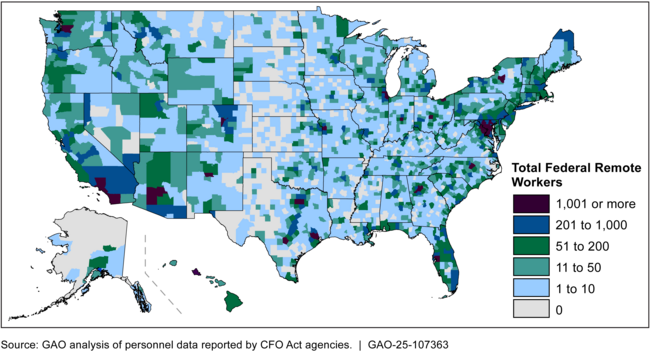Federal Remote Work: OPM Guidance Could Help Relevant Agencies Evaluate Effects on Agency Performance
Fast Facts
As of June 2024, over 200,000 federal employees (9% of the federal workforce) worked remotely across the country. Since then, the President directed agencies to cancel remote work arrangements, but with exceptions for military and Foreign Service spouses and people with disabilities, among others.
The Office of Personnel Management also canceled guidance for agencies to assess how remote work affects their operations and missions, even though agencies still have staff working remotely.
We recommended OPM issue new guidance for agencies offering remote work.

Highlights
What GAO Found
Remote work is an arrangement where an employee works from an approved alternate location (e.g., their home), but is not expected to report to an agency worksite on a regular or recurring basis. In June 2024 there were 207,710 remote workers across the 24 Chief Financial Officers Act agencies, which comprised 9 percent of the total civilian workforce at these agencies. Remote workers were in all 50 states and the District of Columbia, and 84 percent of counties (see figure).
Chief Financial Officers (CFO) Act Agency Remote Workers by County, as of June 2024

Most agencies reported analyzing how remote work affected their ability to recruit and retain staff and found offering it likely had positive effects. For example, the Office of Personnel Management (OPM) found that for similar positions, remote job announcements received 366 applications on average, compared to 51 for non-remote. GAO also found that agencies with a higher percentage of remote job announcements were more likely to meet hiring goals for mission-critical jobs.
In January 2025, the President directed executive agencies to require that all employees, including remote workers, work from an agency location full time. Subsequent guidance allows remote work in some circumstances, such as for military and Foreign Service spouses, those with qualifying medical conditions, and other “compelling reasons.” However, OPM canceled its August 2024 guidance that agencies assess remote work's effects on their mission, recruitment, and retention, making it less likely agencies will understand its effects on outcomes and operations.
Selected agencies took actions to reduce their office space holdings as telework and remote work led to fewer employees reporting to an office location from 2020 through 2024. In March 2025, officials at three of those agencies told GAO they paused further actions as they reassessed the amount of office space needed given return-to-office requirements, ongoing agency reorganization and workforce reduction efforts, and other current administration priorities.
Why GAO Did This Study
While federal agencies offered limited opportunities for remote work before 2020, its use increased in response to the COVID-19 pandemic to help agencies maintain the continuity of their operations. In 2021, agencies were encouraged to leverage remote work, when appropriate, to support employee recruitment and retention and reduce real estate costs. In 2025, the President directed agencies to end remote work, with certain exceptions.
The National Defense Authorization Act for Fiscal Year 2024 includes a provision for GAO to report on the use of remote work by federal agencies. GAO reviewed (1) the number and location of remote workers at CFO Act agencies, as of June 2024; (2) the extent to which agencies analyzed the effects of offering remote work on their ability to recruit and retain employees; and (3) the extent to which remote work affected office space use and spending at selected agencies. GAO surveyed CFO Act agencies to collect the number and location of their remote workers, and information on remote work's effects on their recruitment and retention. GAO also reviewed documents and interviewed officials from four selected agencies—the Departments of Agriculture, Education, and Health and Human Services, and the General Services Administration.
Recommendations
GAO recommends that OPM issue guidance for agencies to assess benefits and costs when offering remote work, including its effects on agency outcomes, recruitment and retention, and operational costs. OPM partially concurred with the recommendation and described planned actions to implement it.
Recommendations for Executive Action
| Agency Affected | Recommendation | Status |
|---|---|---|
| Office of Personnel Management | The Director of the Office of Personnel Management should issue guidance for agencies to assess the benefits and costs when offering remote work positions, including its effects on the mission and outcomes of the agency, employee recruitment and retention, and operational costs. (Recommendation 1) |
On December 31, 2025, OPM issued a revised Guide to Telework and Remote Work in the Federal Government. Among other things, the guide includes instructions stating that agencies should conduct a formal and complete assessment of benefits and costs before establishing remote work policies and programs or approving a remote work arrangement for an employee. The guidance stated agencies' remote work policies should include a requirement for routine, periodic reevaluations of such arrangements and the overall agency program to identify problems and improvements. The guidance included a number of possible factors agencies could consider in their evaluations, including 1) the impact on agency operations, mission needs, and outcomes and goals, including remote worker productivity, performance, and conduct, 2) business impacts including agency real estate, equipment, and other business-related costs, 3) cost of terminating or adjusting remote work agreements based on changing workforce policies and mission needs, including relocation or workspace costs, and 4) time and attendance audit results. As a result of OPM's actions, agencies now have guidance needed to assess how their use of remote work affects mission outcomes and operations and identify and address any issues, thereby maximizing remote work's effectiveness when used.
|
